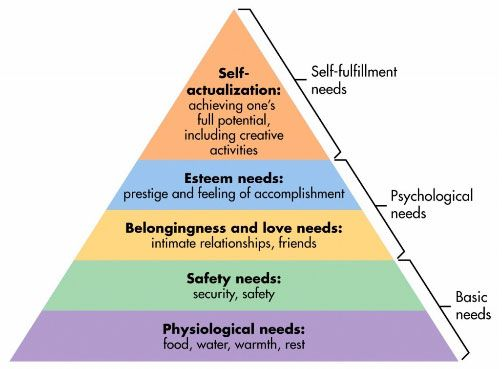![]()
As an interviewer, you have probably been asked thousands of times “why would I want to work here?” But this question can be a trap for interviewers, who will often recite personal preferences about the workplace, thus leaving them left empty-handed when the candidate asks “Why do you like working here?” Using a psychological framework called Maslow’s Hierarchy of Needs, interviewers can quickly develop a complete list of benefits that will appeal to every candidate and offer a comprehensive picture of the agency’s tangible strategic advantages to job-seekers. In addition, this system can be utilized by interviewees, to help get a better understanding of the agency and uncover potential warning signs that could hinder a career and workplace contentment.
Maslow’s Hierarchy of Needs
In 1943, Abraham Maslow proposed that humans are motivated by five sets of specific needs, and that every level was dependent upon the prior level’s need being fulfilled. The five needs can be grouped into three categories; basic, psychological and self-fulfillment needs. In this article, we will explore each category and the respective needs, in order of importance.

(Image source and more information at: http://www.simplypsychology.org/maslow.html)
Basic Needs
The first set of needs in Maslow’s theory are the essential requirements that all humans must have to exist. For a government agency, this would include many things that are regulated by law, such as a facility that is a safe workplace environment and has a comfortable climate. But additional selling points to candidates would include “upgrades” like a café in the building, or a roving security guard who escorts people to their cars when working late. On the other end of the spectrum, if the staff is constantly shorthanded or if you learn that employees bring their own refrigerators into the workplace because food is frequently stolen from the office fridge; the agency may have a “basic needs” deficiency that should be addressed.
Psychological Needs
The second group of the Hierarchy contains the psychological needs; belongingness and esteem. To instill a sense of belongingness during interviews, make sure to mention your agency’s softball team, or the fact that employees meet after work for dinners or an occasional beverage. Esteem, or the feeling of accomplishment, is a double-edged sword; your agency has to value their employees and recognize the work that they do. Warning signs for potential candidates would be a workplace that discourages fraternization or lacks formal and informal recognition programs.
Self-fulfillment Needs
The top of the pyramid centers around the question that every candidate should ask; “how can your agency ensure I’ll be pushed to my limits?” Achieving one’s full potential is the ultimate goal, said Maslow, and every hiring manager should be prepared to expound on the opportunities that exist both in the department and across the agency. Training and agency mentorship programs are also key benefits to cover in this realm, to help the employee reach new heights of professional proficiency. Hazards at this level include minimal opportunities for advancement, or a lack of a substantial training budget.
As shown, this can be an invaluable tool for hiring manager to impartially evaluate the perceived benefits of an agency, but it can also be used in a proactive manner. If weaknesses were identified in the organization, improvements can be made prior to launching a recruitment campaign. The goal of every hiring manager should be; if you wish to attract employees who are going to reach their full potential, an agency must be prepared to provide a firm foundation, by fulfilling an employee’s basic and psychological needs before they even walk in the door.
In addition, a job-seeker can use this same process during a formal interview, and when meeting with individual members of the team. Utilize the same techniques that the interviewer will put to use by asking behavior-based questions such as:
- Can you provide an example of when your supervisor recognized you for work you’ve accomplished?
- How was the incumbent in this position truly challenged to do their best?
- Describe a situation that shows how cohesive teamwork environment here.
Whether you are applying for your first job, or conducting your one-thousandth interview, Maslow’s Hierarchy of Needs, can identify areas for improvement and give you new insight on selling points for your agency and the important work that you do.
Where does your agency excel? What are your bragging rights on the Hierarchy of Needs?
Daniel Hanttula is part of the GovLoop Featured Blogger program, where we feature blog posts by government voices from all across the country (and world!). To see more Featured Blogger posts, click here.





Leave a Reply
You must be logged in to post a comment.